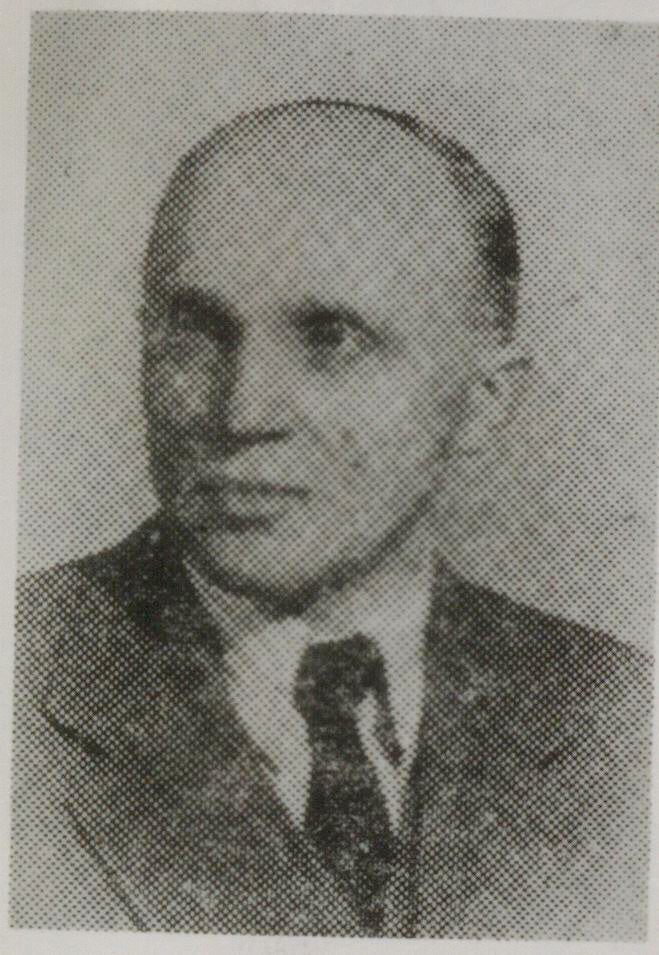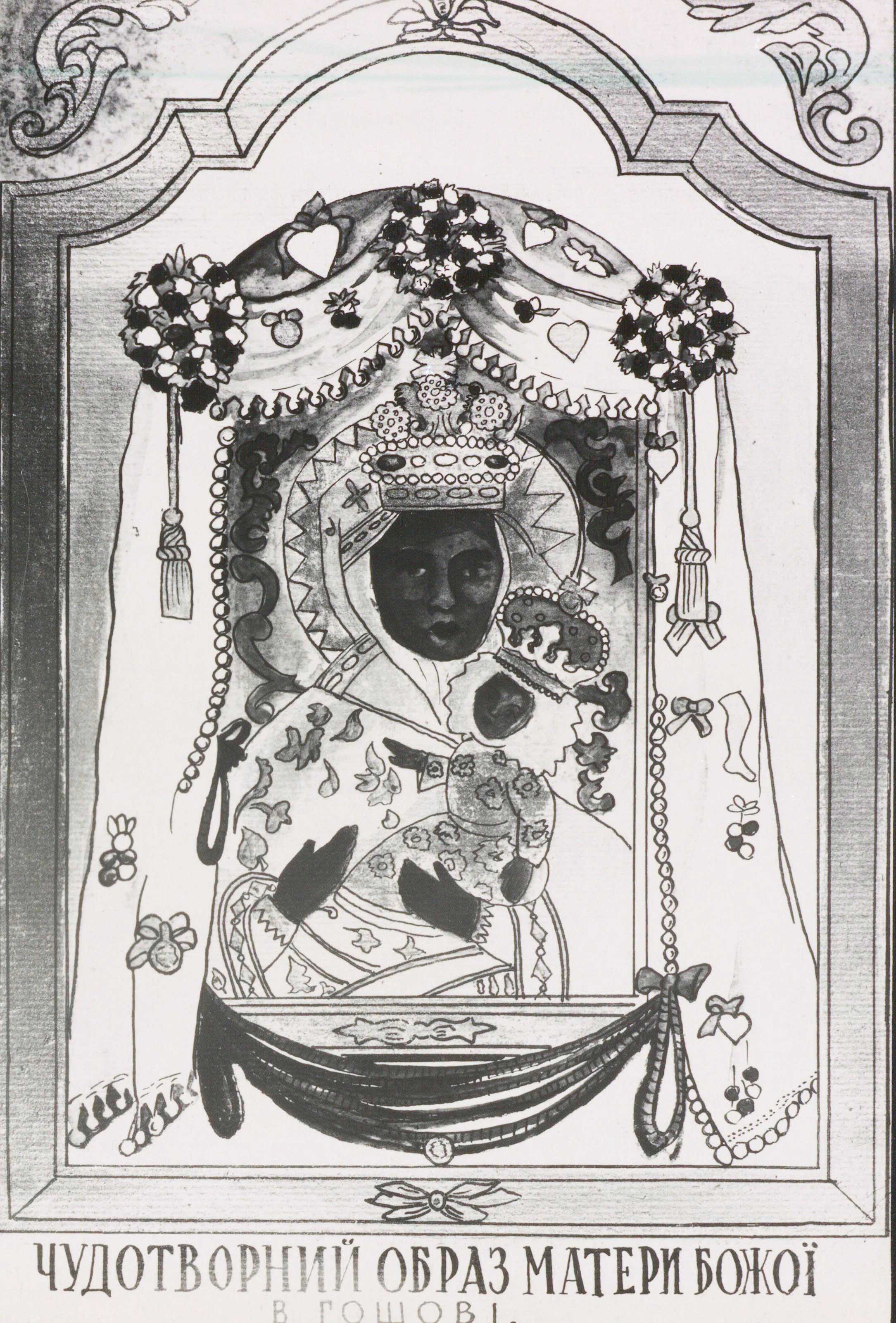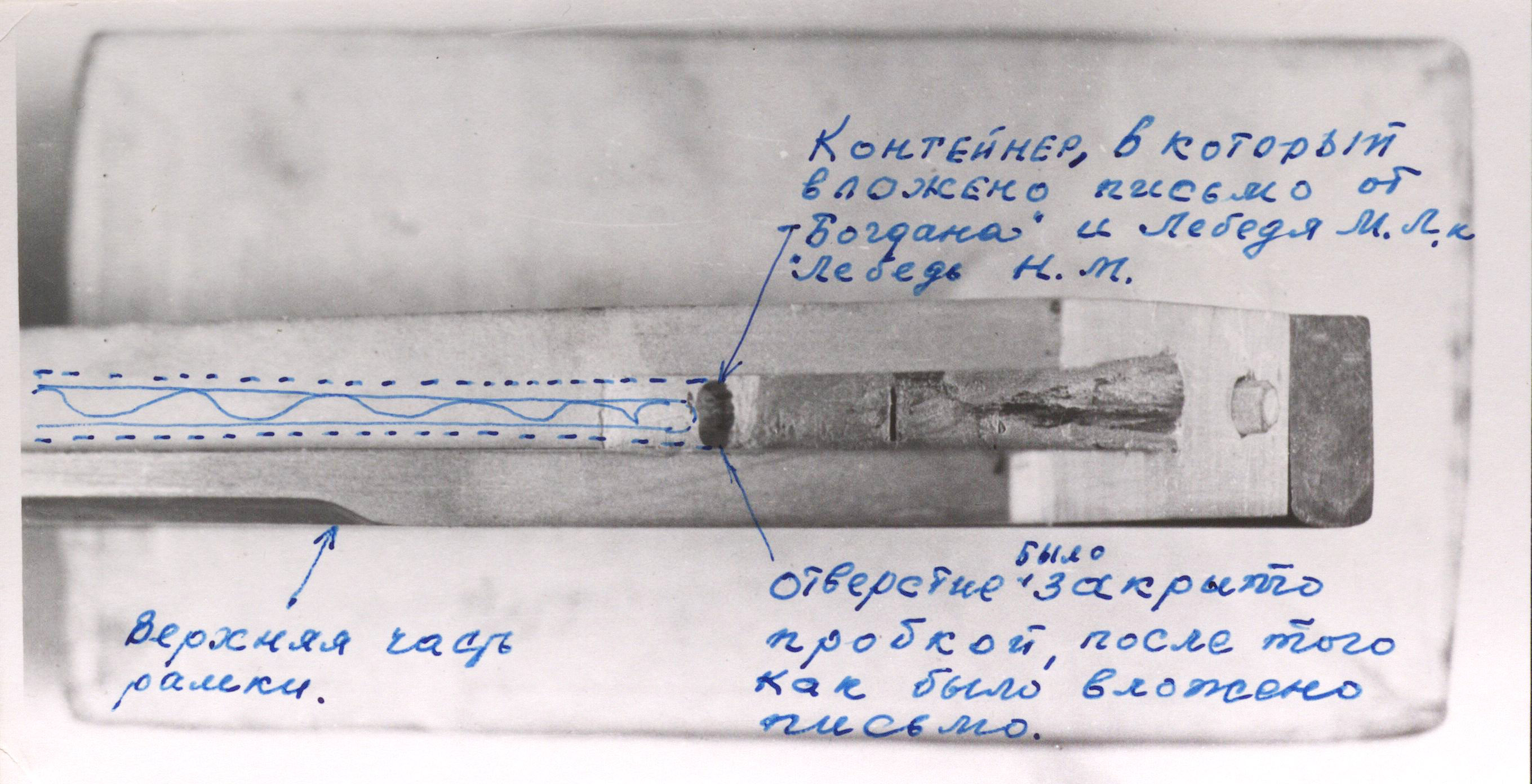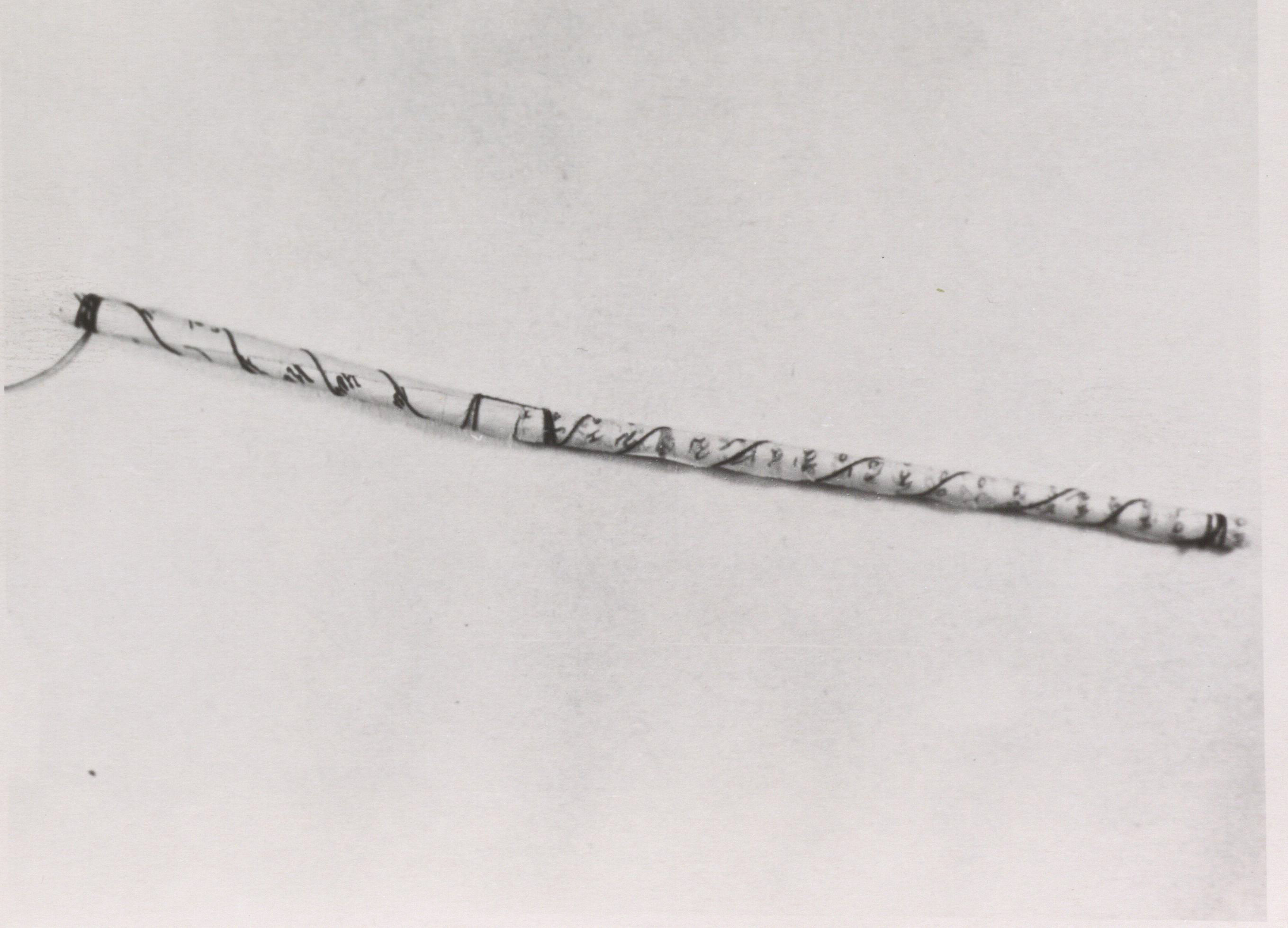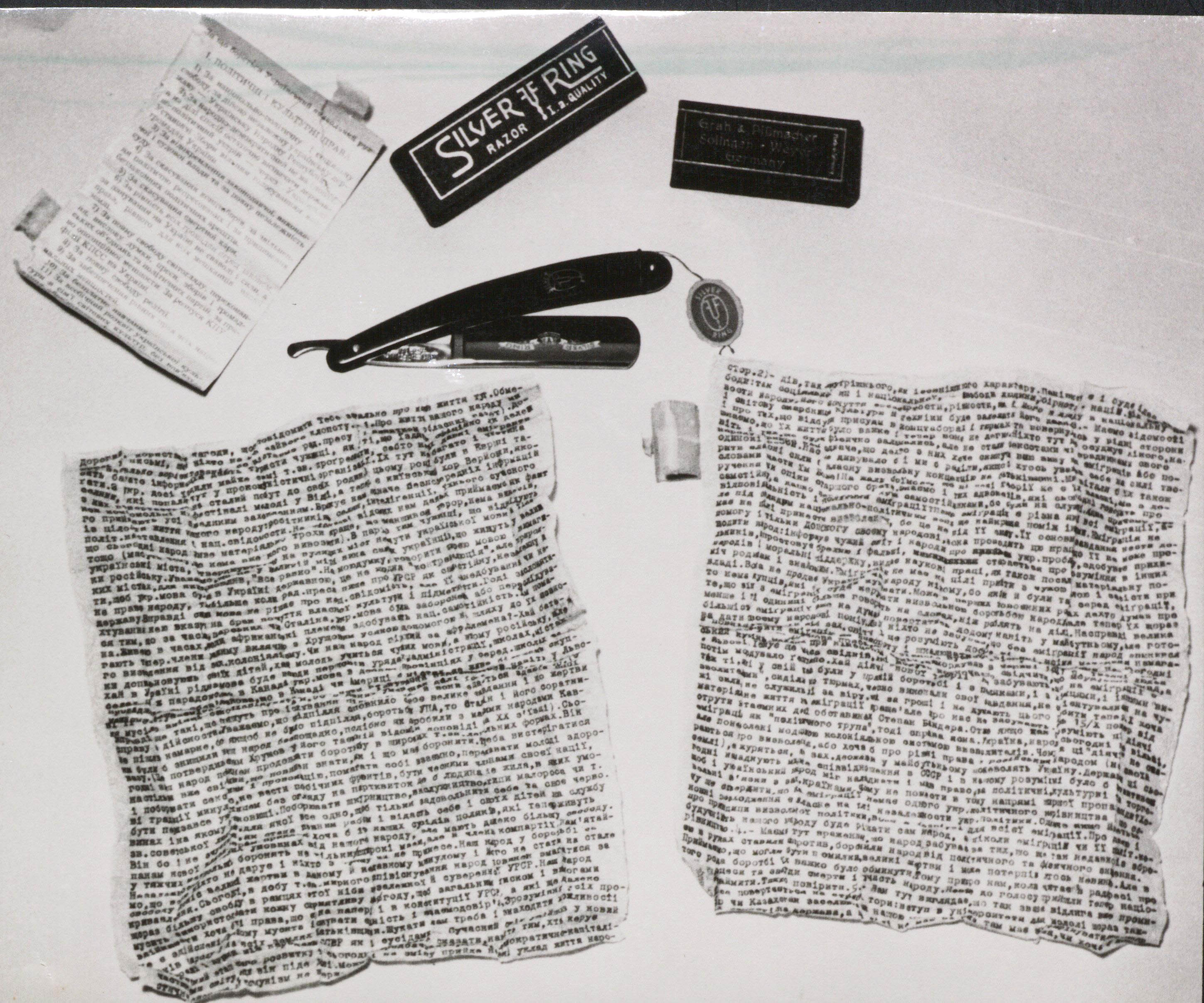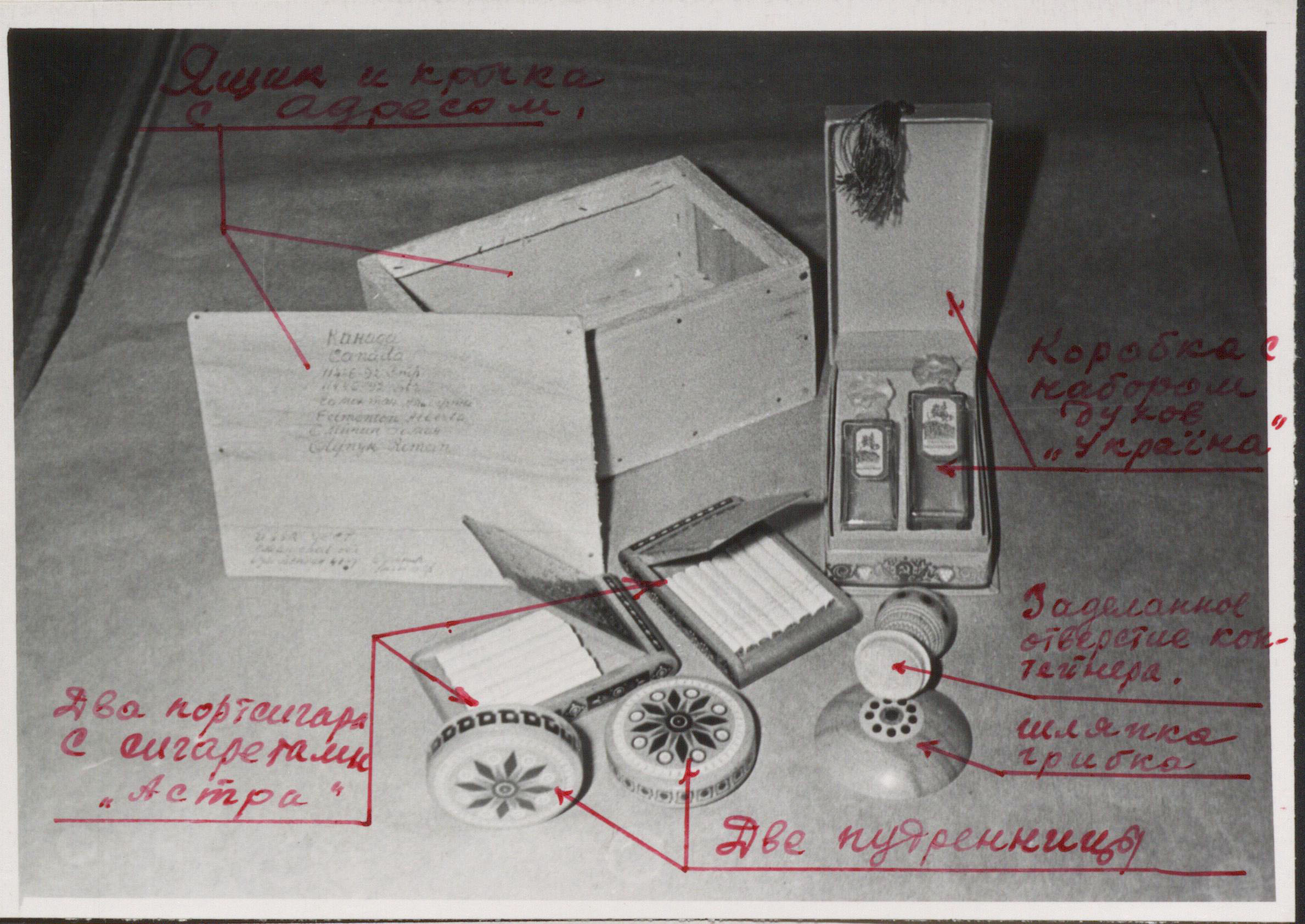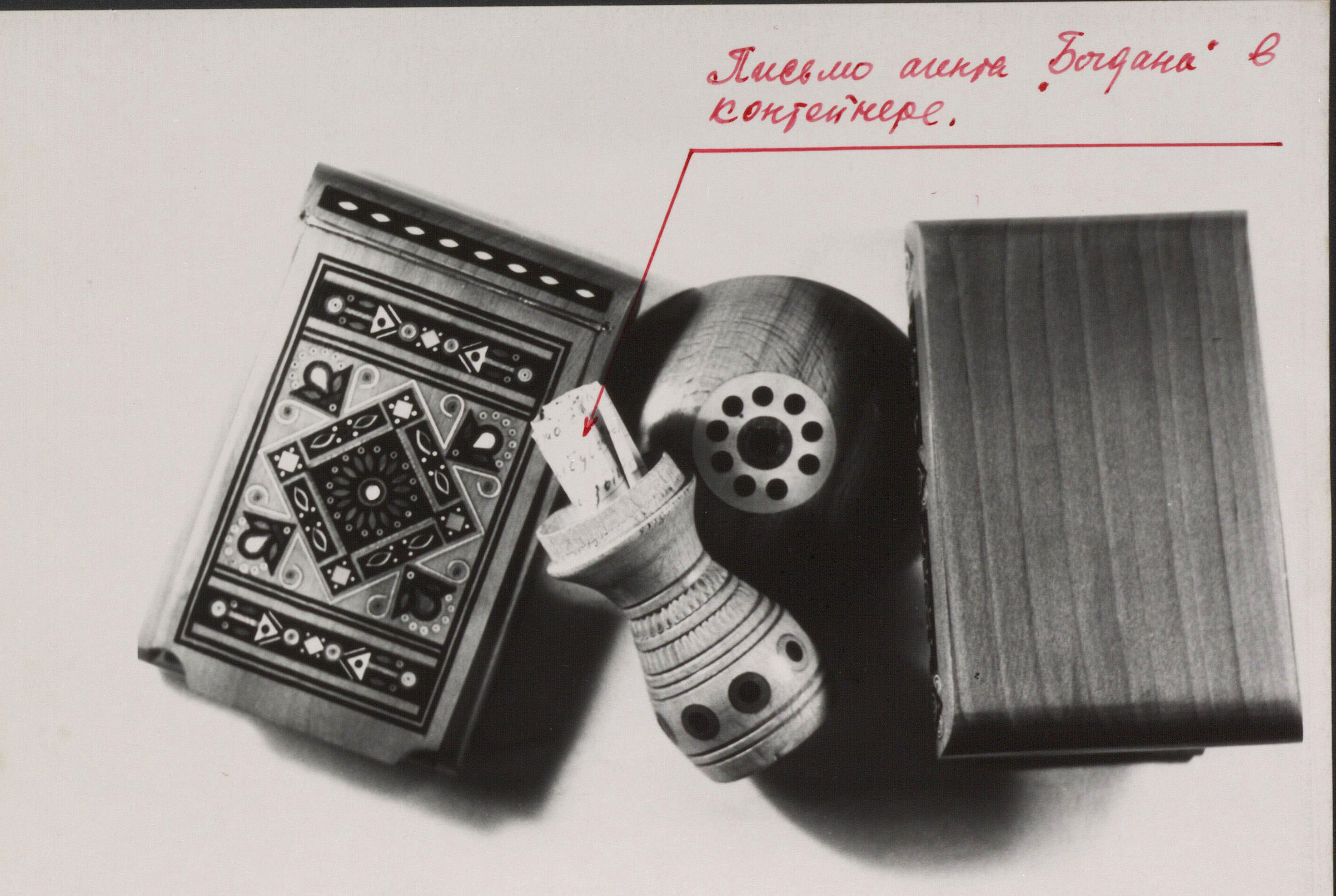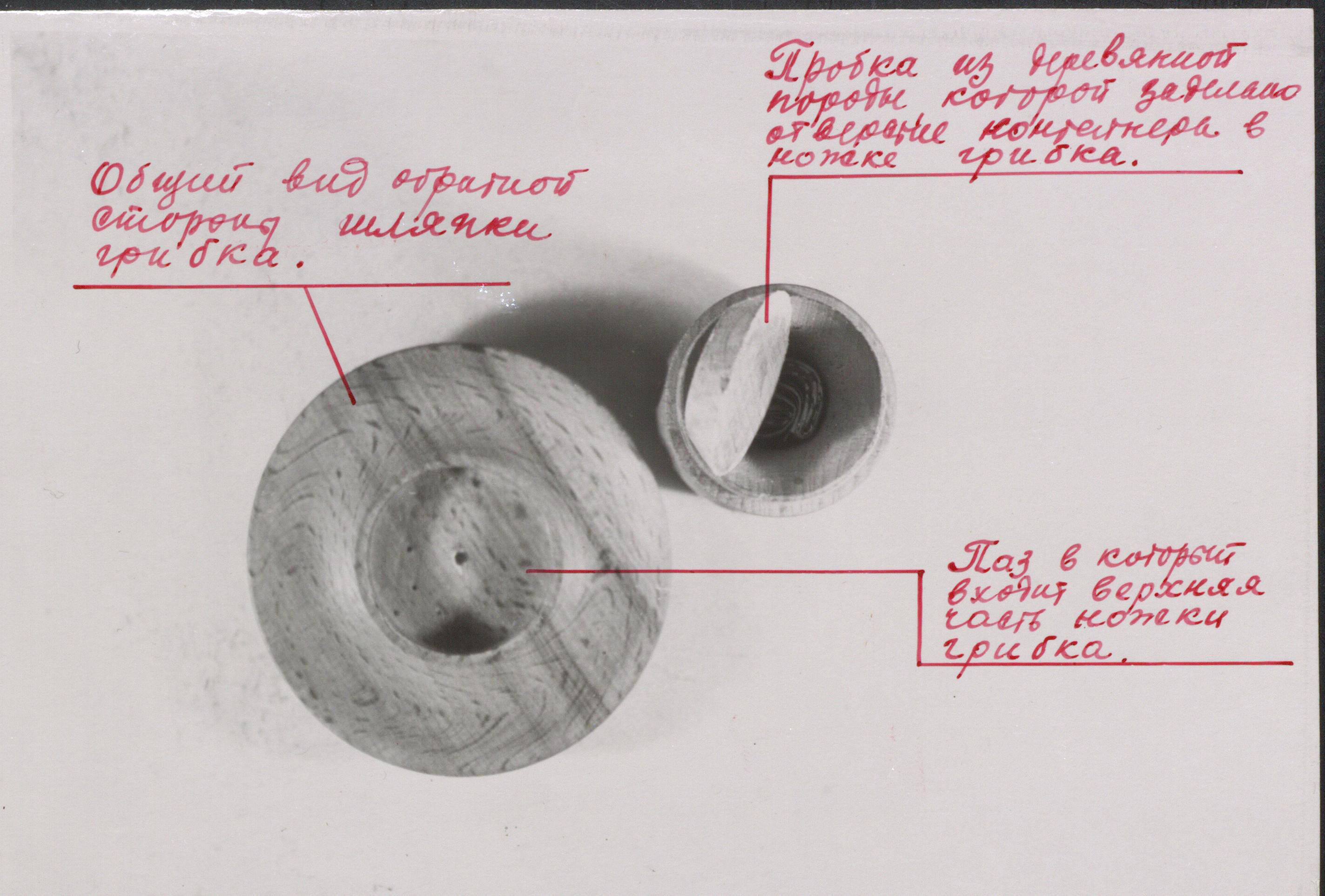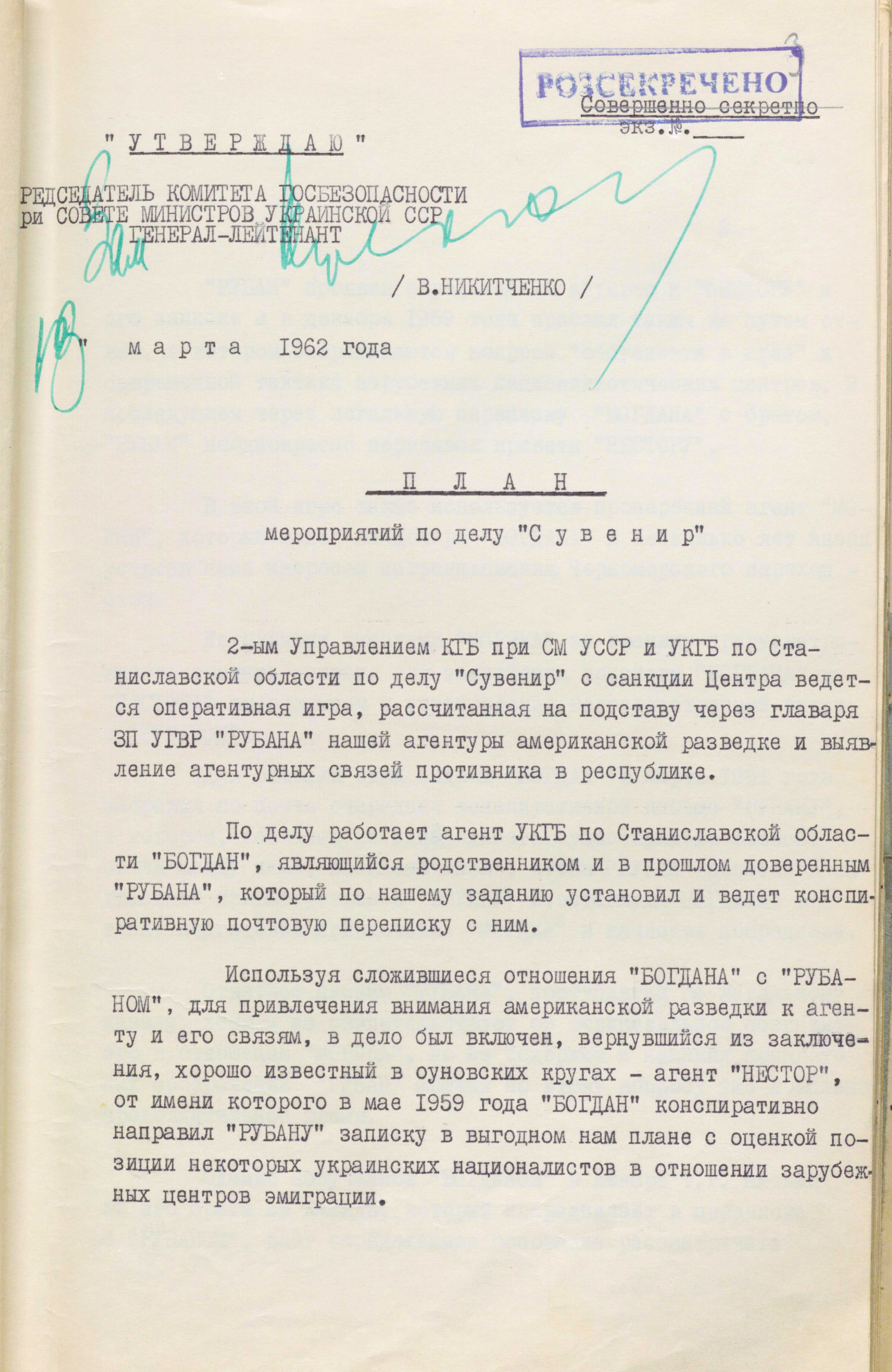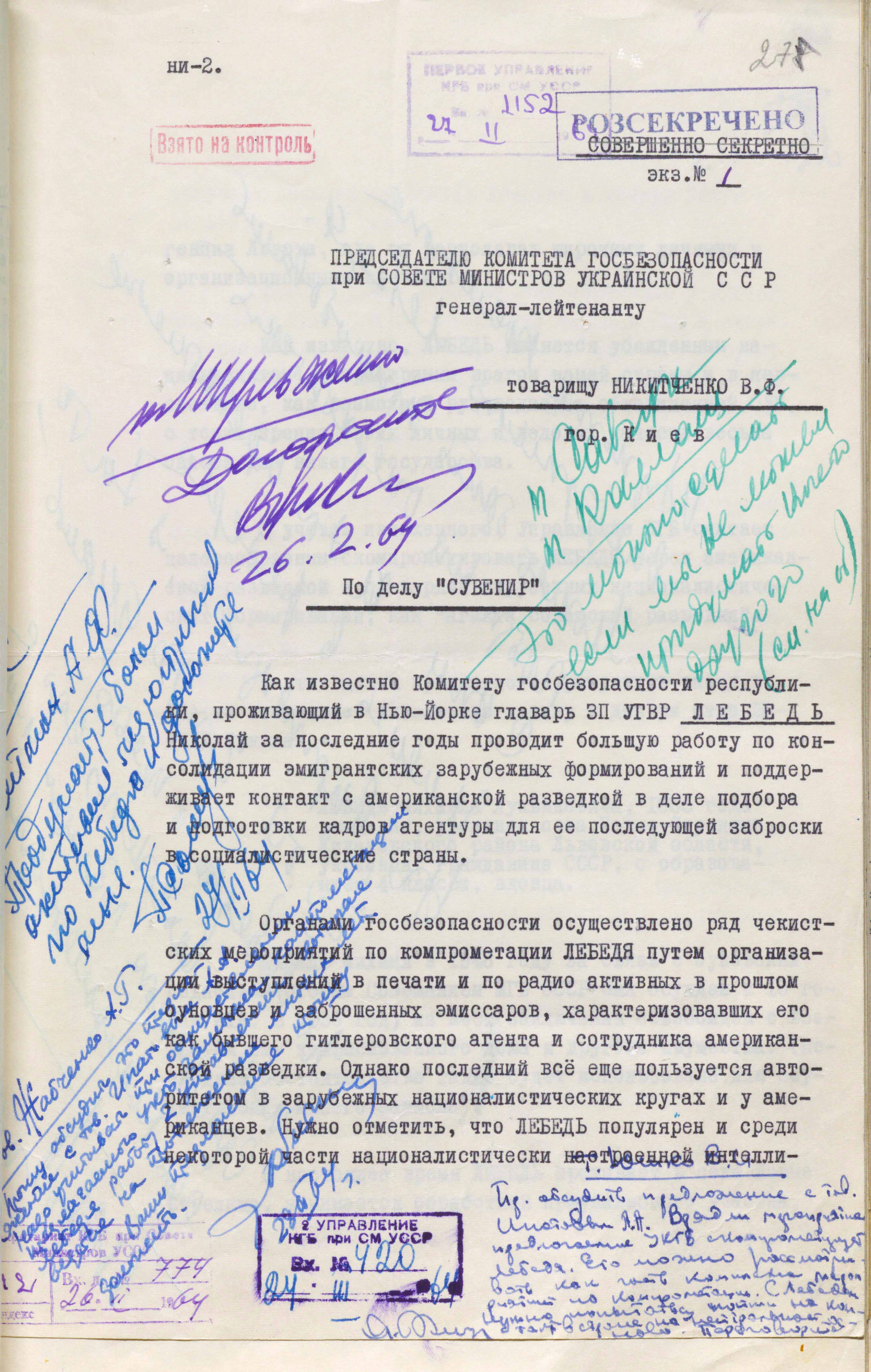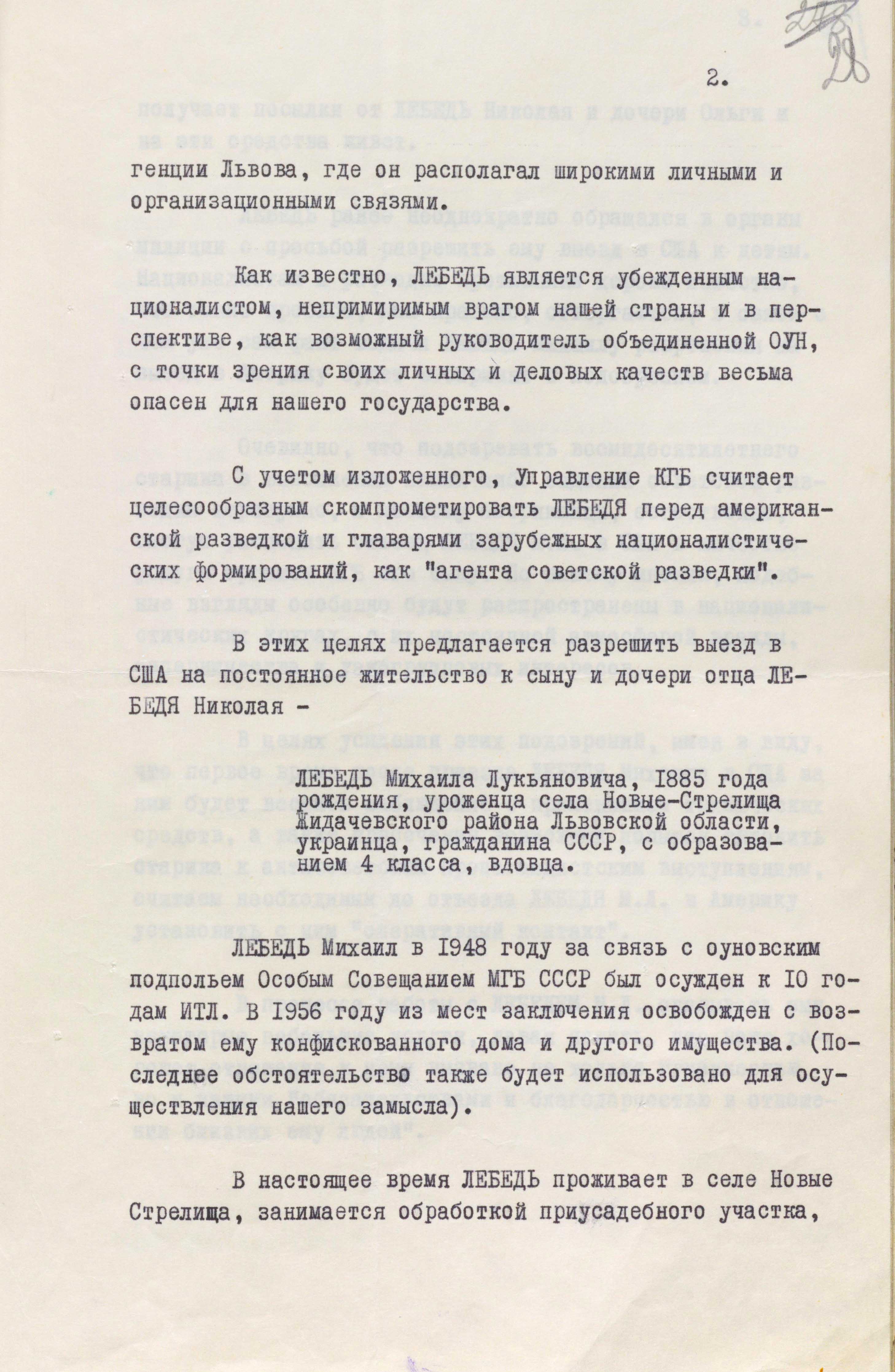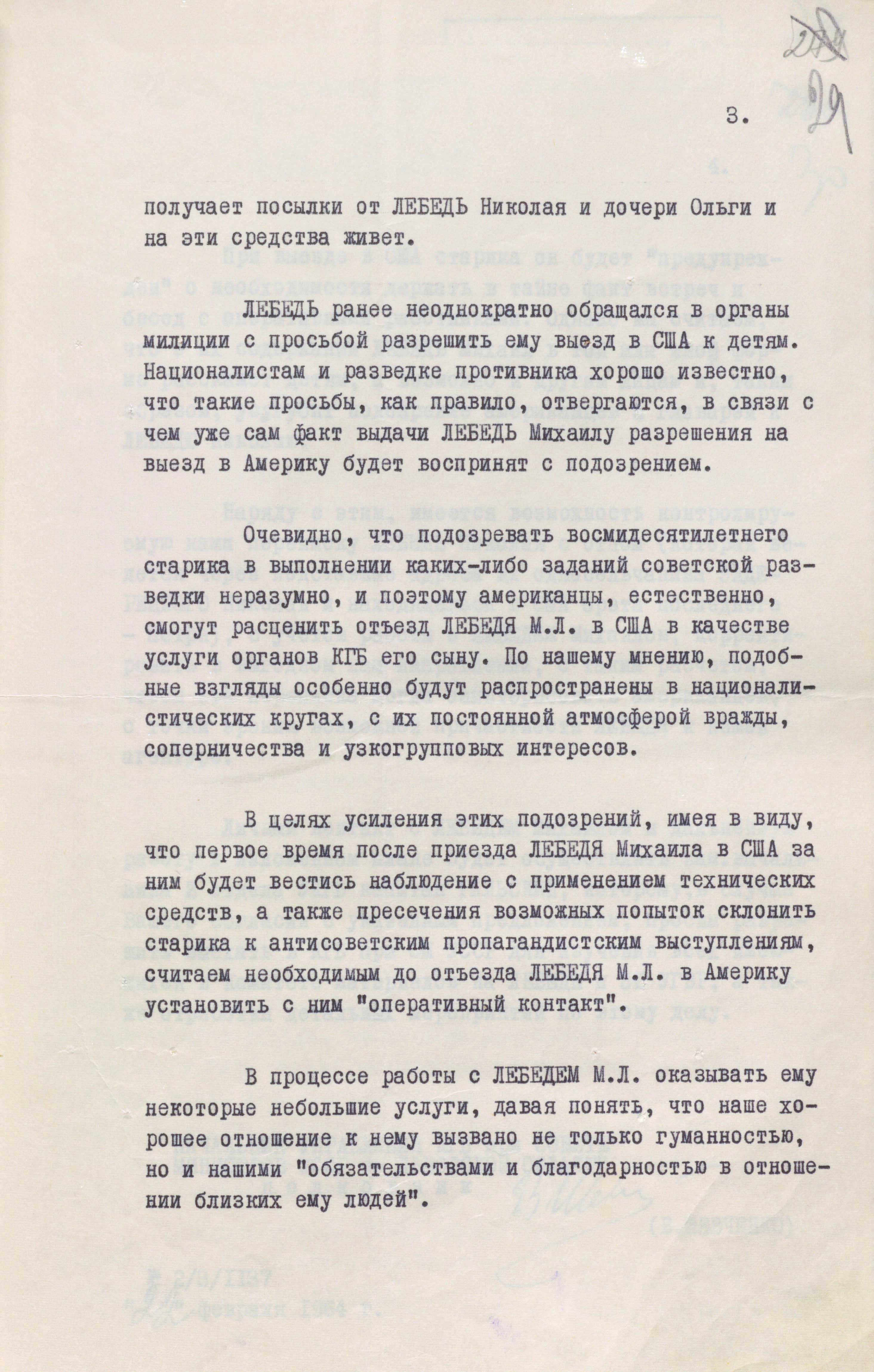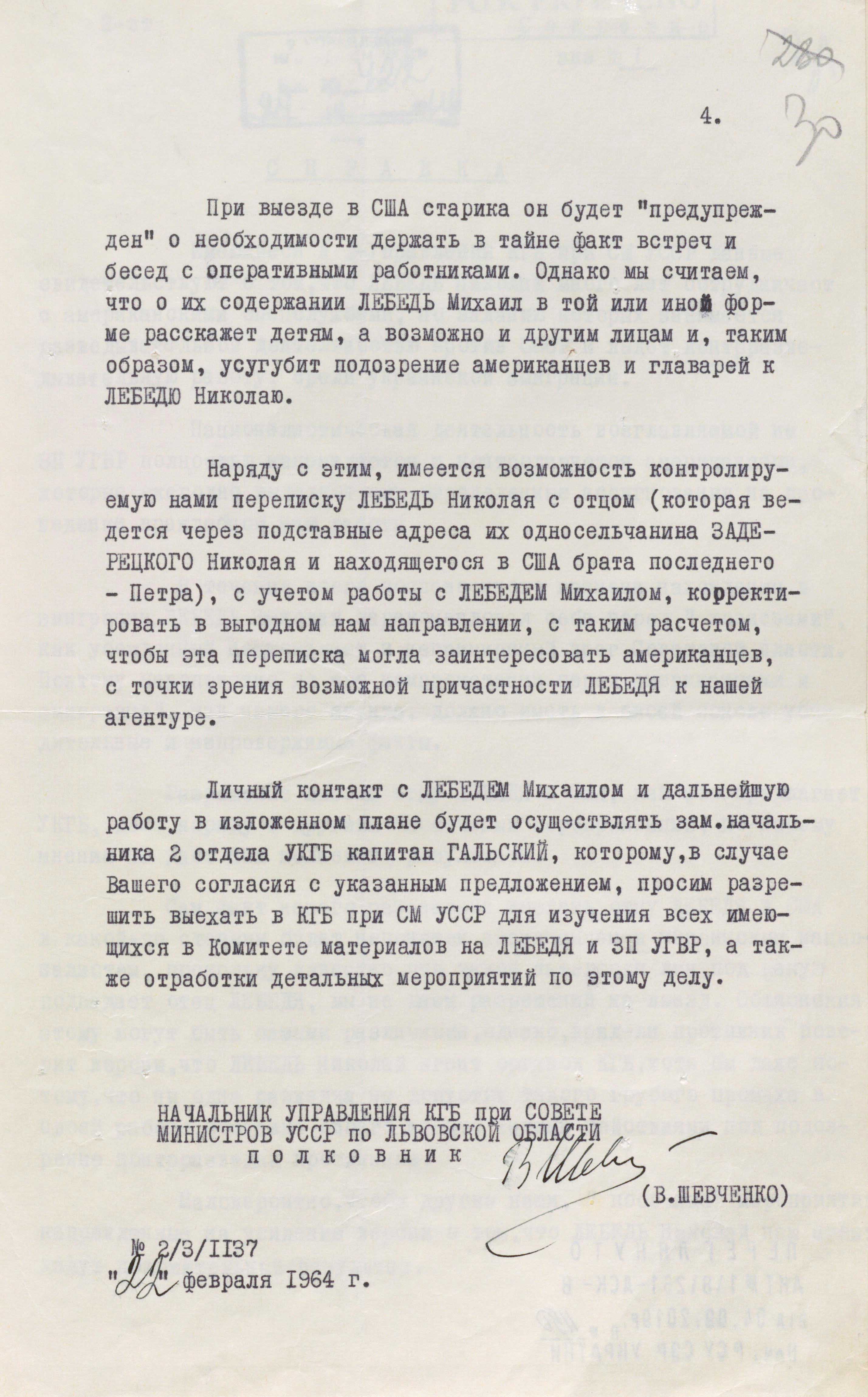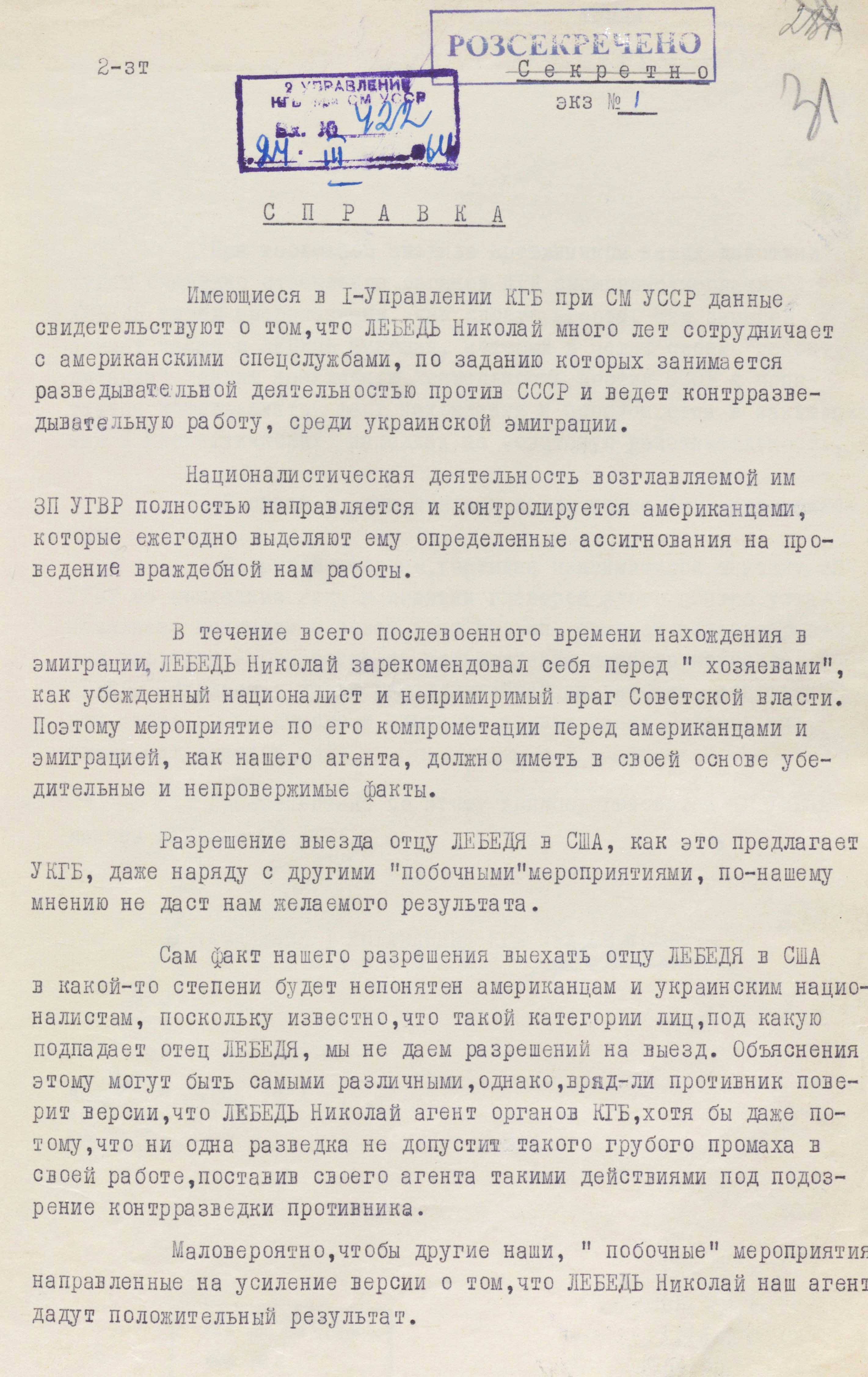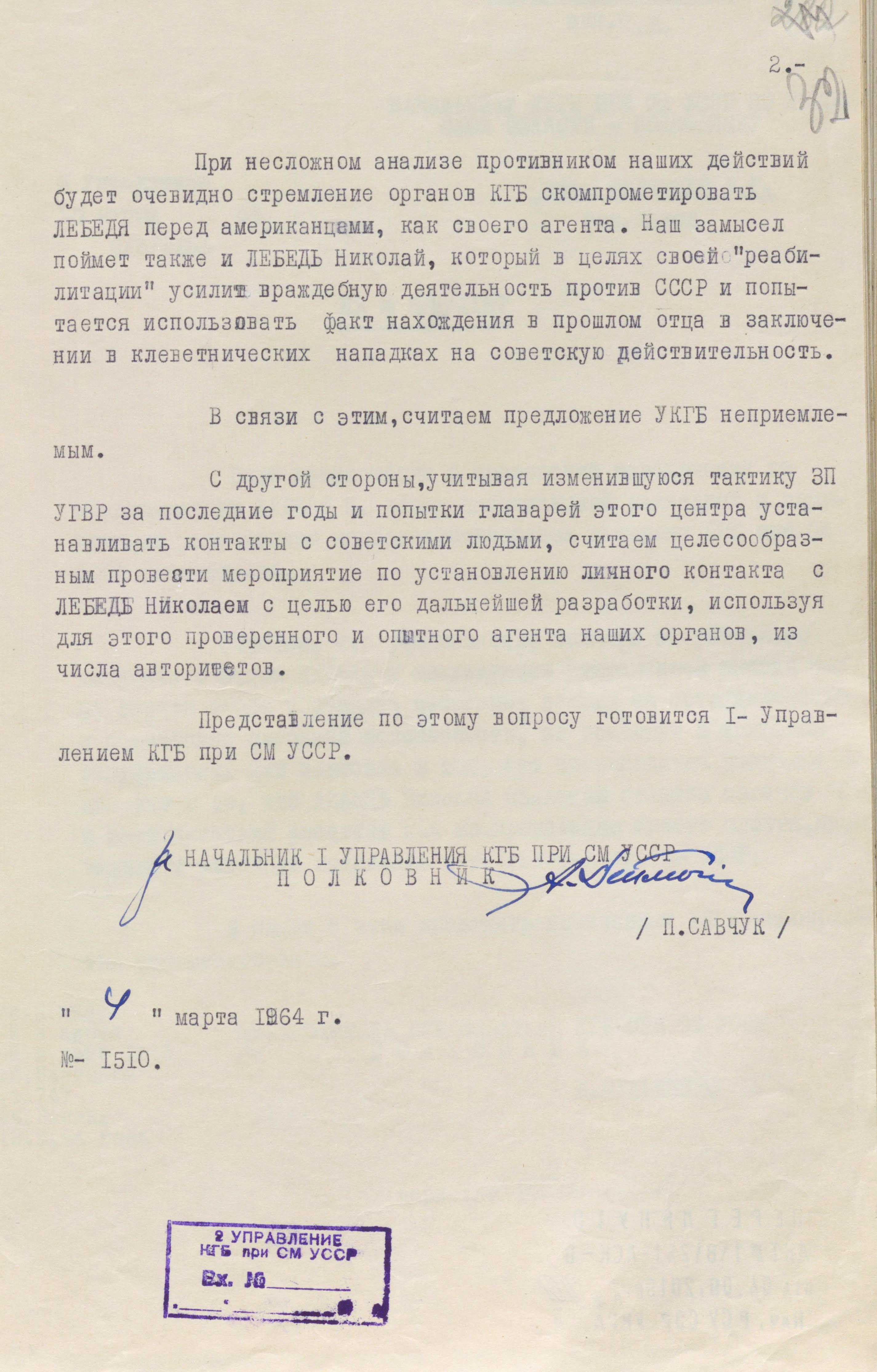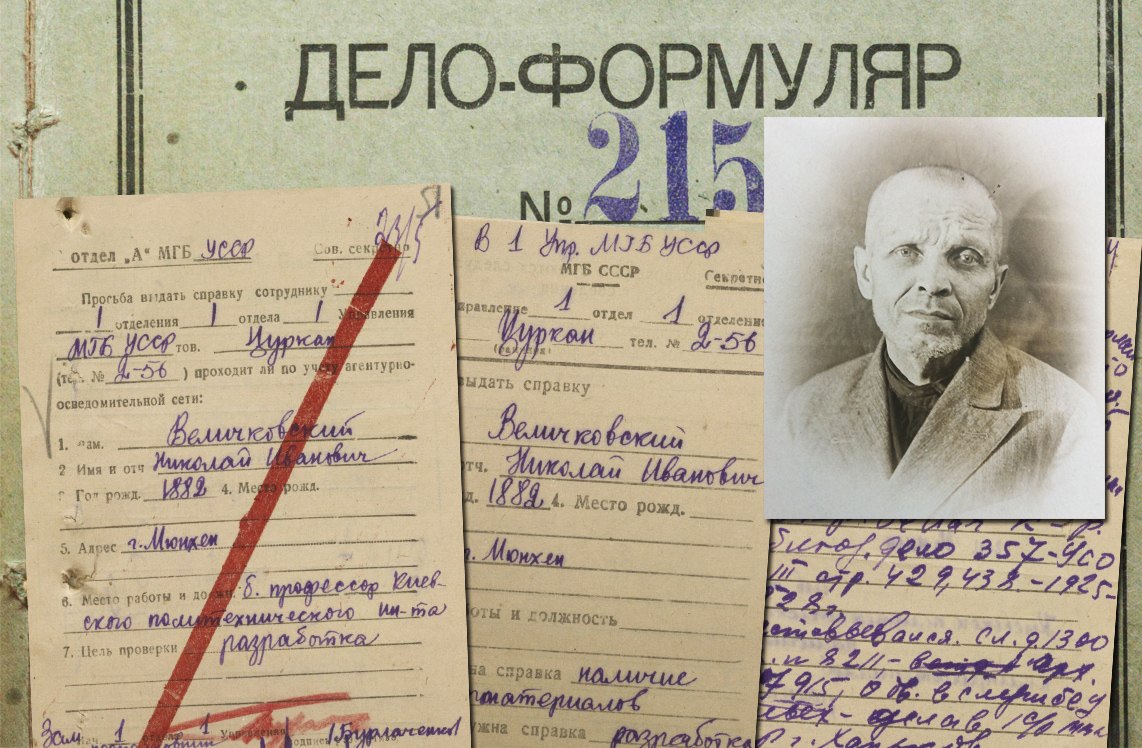A “Souvenir” for the Founder of the OUN Security Service Mykola Lebed
7/24/2024
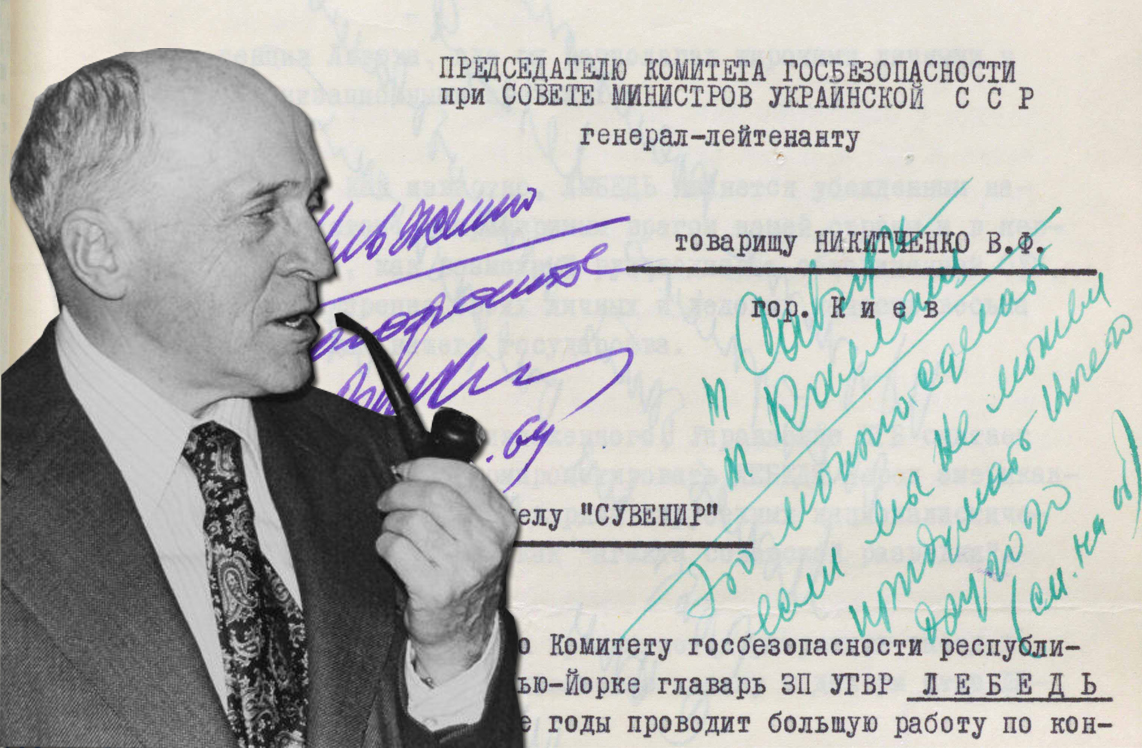
The figure of the founder, organizer and first chief of the OUN Security Service (Ukr. Sluzhba Bezpeky - SB), Mykola Lebed, was the focus of the kgb’s special attention. Even when he was far away across the ocean in the United States, they tried to send agents to him, learn about his views, find out his plans, commit a high-profile provocation, and even intended to use him to resuscitate the search for the OUN gold buried in the Carpathian forests. The declassified documents from the archives of the Foreign Intelligence Service of Ukraine tell about all this.
“Holy” Scripture
Throughout his life, Mykola Lebed was in the field of view of the nkvd/kgb. But then, likewise, the activities of the soviet state security agencies had always been subject to his close professional attention. This confrontation was quite long and irreconcilable. As the founder and first chief of the OUN Security Service, he implemented a rigorous system of countering the moscow-bolshevik agents’ infiltration into the Ukrainian national liberation movement in Ukraine and abroad. The chekists were well aware of this, were furious about the numerous exposés, and tried to get to one of the main architects of the system, who was known in the OUN ranks under the pseudonyms “Maksym Ruban,” “Marko,” “Yevhen Skyba,” “Oleh,” “Ihor,” “Yaropolk,” “Vilnyi”, and others.
But M. Lebed was known not only for his involvement in the creation of the OUN Security Service. The nkvd’s papers on him state that in his youth he was a member of the underground Ukrainian Military Organization, and later – an active member of the Organization of Ukrainian Nationalists. In 1934, he prepared an assassination attempt on Polish Interior Minister Bronisław Peracki for repressive measures against the Ukrainian community in Halychyna. After the assassination attempt, OUN member Hryhoriy Maciejko fled to Germany, but was arrested by German police and extradited to Poland. At the Warsaw Trials, he was sentenced to death, which was later commuted to life imprisonment. In September 1939, he escaped while being escorted to another prison. In 1941, he became Stepan Bandera's second deputy in the OUN(B). Soon after, he became the leader of the OUN (B) in western Ukraine and played an important role in the formation of the Ukrainian Insurgent Army. In 1944, he co-founded the Ukrainian Supreme Liberation Council (UHVR – underground Parliament) and became the Secretary General of Foreign Affairs of the UHVR.
After World War II, as noted in the documents, M. Lebed first lived in Italy, then in West Germany, where he established ties with American intelligence. At that time, the leaders of the Ukrainian nationalist movement hoped that the conflict between the West and the ussr would escalate into an open phase and that the Ukrainian issue would again become relevant in international politics. It was extremely important for the UHVR to find a Western ally who could help in continuing the struggle for Ukrainian independence. That is why they established such contacts. This cooperation was beneficial to both sides and was aimed at supporting the Ukrainian liberation movement, on the one hand, and at providing information about soviet plans in postwar Europe, on the other.
It was M. Lebed who was engaged in establishing such cooperation in various forms in the postwar period. By the time a new agent-operational cultivation was launched in 1955, which was named “Souvenir” by the kgb, he had already moved overseas and lived in Yonkers (New York, USA). He was one of the leaders of the Ukrainian diaspora, a member of the board of the Ukrainian Society of Foreign Organizations, which was headquartered in Munich. As part of the Toronto Publishing Committee of the “Chronicles of the UPA”, he collected and documented the history of the Ukrainian struggle against Nazism and communism, and personally wrote a large monograph entitled “UPA”. Besides, he headed the “Prologue” Research Center (from 1952 to 1974) in New York, which published the journal “Suchasnist” (“Modernity”- Transl.). This journal, along with other thorough studies, reprinted works by authors banned in the ussr.
It was his work at the helm of “Prologue”, which the kgb called the “brainchild” of the CIA, that became the basis for the agent's cultivation of M. Lebed. To do this, they collected information about his relatives and acquaintances in the ussr and abroad, through whom they could first establish correspondence with him under their control. Soon they decided on his uncle Mykhailo on his mother's side. He knew M. Lebed personally, met him several times back in the 1930s, and even provided temporary shelter in his home when he was hiding from the Polish police. The uncle corresponded with his brother Roman, who lived in the Canadian city of Edmonton. Roman also knew M. Lebed and was able to see him and communicate with him on the American continent.
Therefore, the kgb conducted appropriate “explanatory work” with Uncle Mykhailo and obtained his consent to participate in an operation “in the interests of the soviet union and its communist party” to infiltrate into the American special services – “the main enemy of the ussr”. He was told that his nephew was in the enemy's net, that the kgb would not take any action against him, but would only seek to learn about the anti-soviet plans of the US intelligence services. Later, he would appear in the case under the pseudonym “Bohdan”.
In another letter to his brother in Canada, “Bohdan”, on the kgb’s instructions, sent greetings to M. Lebed and asked how he was doing there. In April 1957, in the envelope with the letter from his brother, he found another letter written in a different handwriting. It was a message from his nephew. M. Lebed was happy to hear from his relative and wrote the following:
“...I continue to work in my rank. I have not changed, Mykhailo, over the years, except that I have become older. I haven't made great money, because I never had the intention to become a rich man, or as you say, a capitalist, but I have enough to live on. I also did not forget my people, from whom I originate...”
(BSA of the SZR of Ukraine. - F.1. - Case 12314. - Vol. 1 - P. 83).
At that time, M. Lebed's father, Mykhailo Lukianovych, returned home from the camp in Vorkuta, where he was serving a sentence for anti-soviet activities (all archival documents mention him as Mykhailo, while some open sources call him Kyrylo). “Bohdan” was given the task of meeting with him, renewing old family contacts, and thus becoming even closer to M. Lebed himself. Soon, the kgb learned that Mykola Lebed’s father had been corresponding with other close relatives living abroad, and they offered him a trip to Poland, and from there they would allegedly be able to take him to the United States for permanent residence. They decided to use “Bohdan” as an intermediary in the negotiations. And since this issue was quite sensitive, they took the opportunity to transfer further correspondence with M. Lebed to a secret basis.
Therefore, the parcel for M. Lebed was prepared especially carefully for sending to Canada through Mr. Roman. Among the various gifts, such as embroidery, candy, cigarettes, and dried mushrooms, was a copy of the Goshiv Miraculous Icon of the Mother of God from the Goshiv Monastery in Prykarpattia. But before that, the frame was disassembled and thin through holes were drilled in the upper and lower slats. In one of them they put a tightly rolled letter from Bohdan about the options for taking Mykhailo Lebed to Poland. The other was a letter from Mykhailo's father. On one side, the hole was filled with paraffin, and on the other, a planed piece of wood was inserted.
In the next letter to his brother Roman, “Bohdan” hinted that the frame of the icon was made by Hutsul craftsmen from precious wood and that it should be of great interest to M. Lebed. He advised him to carefully disassemble the frame and look inside, where it was not painted over, to see what kind of wood was used. In this way, he hinted at the existence of a cache.
Thus, the operational game “Souvenir” entered another phase.
A Letter in a Razor for Shaving
Not immediately, but after additional explanations in the letters that followed, M. Lebed figured it all out. He pulled the letters out of the hiding place and read them. Having made sure that the scheme was working, the kgb decided to send another parcel with a secret container. This time, a letter from one of M. Lebed's old acquaintances was put into the drilled holes in a wooden frame with family photos. He wrote that he had returned from exile and was concerned that the nationalist underground in the region had been liquidated, and that political emigration abroad was not doing what was needed to and was not contributing to further liberation struggle. Of course, according to the documents, that acquaintance was under the control of the chekists and as an agent had a codename “Semenov”. They wanted to make foreign emigration centers get interested in his identity and use him as a basis for further operational activities.
Soon M. Lebed, for his part, prepared “souvenirs” for his relatives. In a letter to “Bohdan,” he reported that an acquaintance of his was returning home from Canada for permanent residence. He intended to send three trunks with various things through him. The letter emphasized that among other things there were “two very good razors”.
In early 1960, the “souvenirs” arrived in Ukraine. There were four razors, but only two of them had inscriptions. Inside, they did find caches containing tightly rolled sheets of thin rice paper. It was a large message from M. Lebed on four pages, made on a typewriter. The chekists would have preferred not to show its contents to anyone else, it was so full of “outrageous” thoughts and conclusions. It was a response to “Semenov”'s letter, but in fact a kind of address to the entire Ukrainian people.
M. Lebed pointed out that the leaders of the emigration were aware of the liquidation of the underground in Ukraine. However, in his opinion, that struggle was not in vain. “We believe that the underground fulfilled its great task and that the victims were not in vain,” he wrote, ”because if there had been no underground, no UPA struggle, stalin and his associates would have destroyed our people mercilessly, just as they did with the small peoples of the Caucasus. (This was confirmed by Khrushchev himself in his secret, well-known report to the 20th Congress.) Today our people must continue the struggle in broad so-called legal forms. The people today is so conscious that it must know how and what it must defend. We must guard and fight against secret agents and provocations, help ourselves mutually, pass on the healthy traditions of the past to the young, not lead side fronts, be honest members of our nation, be Ukrainians first and foremost...”
Regarding those who have served or are serving their sentences in the camps, he pointed out that they were known abroad, that their lives had been hard and were still hard. At the same time, “no one here condemns anyone, even those who were physically broken, but did not become informants or traitors to their people”.
M. Lebed went on to write that no one will give freedom to the Ukrainian people, and no one from outside will bring it. Therefore, it is necessary to “fight for more and more freedom within the framework of this supposedly independent and sovereign Ukrainian ssr..., to use every favorable opportunity to exercise (by general pressure and demands) at least those rights that exist on paper and in the constitution of the Ukrainian ssr, and which are far from being realized. At the same time, there must be unity and mutual trust, understanding of all strata of the people and in all lands of the Motherland”.
He saw the main task of emigration as providing assistance to the national liberation movement in both moral and material terms. In his opinion, emigration is a bridge between the Ukrainian ssr and Western countries, which should constantly draw the world's attention to the Ukrainian issue. “Emigration does not aim at bringing liberation,” he wrote, ”because it is beyond its power. Its main task is to help and only help its people, it carries out this work that cannot be done by the people: informing the foreign world and peoples about the Ukrainian problem, gaining supporters, refuting lies and falsehoods, trying to gain understanding from other peoples...” (BSA of the SZR of Ukraine. - F. 1. - Case 12314. - Vol. 2 - P. 170-178).
Having analyzed the content of the letters, the kgb concluded that M. Lebed remained an “ardent Ukrainian bourgeois nationalist” and continued to hold anti-soviet positions. At the same time, they suggested that he, as the former head of the OUN Security Service, could have figured out this operational game and realized that his uncle was doing everything under the control of the chekists. They felt that it was not for nothing that he delicately hinted to “Bohdan” in a separate letter that if for some reason it was difficult for him to correspond in this way, he did not have to.
“Lebed's response is undoubtedly the collective “work” of the leaders of the UHVR Foreign Office”, one document stated, “who thoroughly studied and researched “Semenov”'s letter... We also believe that American intelligence is well aware of the creation of the letter… The content of the letter may also show that Lebed and his accomplices are not absolutely sure yet whether they are dealing with true nationalists or soviet intelligence. In order to act with certainty, Lebed, of course, needs some more time and more opportunities to analyze and verify the actions of “Bohdan” and “Semenov” (BSA of the SZRU. - F.1. - Case 12314. - Vol. 2 - P. 183).
So, the operational game continued.
The Provocation Is Canceled
Another “souvenir” was sent overseas in the form of a wooden mushroom, which was put in a parcel with other gifts. In an explanation to Roman's brother in Canada, “Bohdan” stated that instead of razors, he was sending M. Lebed a mushroom made by Hutsul craftsmen. This conditional phrase hinted at the fact that there was a dead drop inside. A letter from “Bohdan” was put into the hole made in the mushroom's stem. It was about the fate of the leaders of the Ukrainian underground and other people in whom M. Lebed was interested.
Chekists hid another secret message in the book back of Taras Shevchenko's collection of poems. In it, “Bohdan”, according to the new plan developed by the kgb, pointed out that his son-in-law got a job as a sailor on a ship “leninskyi komsomol”, which sailed all over the world. One of the regular runs was supposed to be to America. Therefore, he offered to meet this relative there and take a closer look at him. “I would like it not to come from me”, he wrote. - It is desirable that you establish a connection with him yourself. So that he is sure that he will make further contacts with me according to your instructions. He, not I!”
The kgb resorted to such a step because correspondence using agent “Semenov” did not yield any significant results. Therefore, they decided to involve the uncle's son-in-law, who got a job at the Black Sea Shipping Company and was given the code name “Moriak” (“Sailor”- Transl.). But even this did not give the desired result. Many months were spent preparing the agent and waiting for the ship’s run to Canada or the USA. During that time, “Sailor” had even been promoted to the position of a boatswain on a ship. But in one of the ports he got into a drunken fight, was suspended from work and soon was transferred to a small ship by the management of the shipping company. After that, he began to lose all interest in cooperation with the kgb and asked to leave him alone. Therefore, this attempt also failed.
Then the kgb decided to resort to another operation to compromise Mykola Lebed. This is stated in the document entitled “In the Case of “Souvenir”, dated February 22, 1964. It stated that despite the chekists’ previous measures to compromise M. Lebed by spreading so-called incriminating materials about him in the press and on the radio, this did not affect his authority in emigrant circles. Moreover, he “is also popular with a certain part of the nationalist-minded intelligentsia” in the Ukrainian ssr. It was further emphasized that he was a convinced nationalist, an implacable enemy of the ussr and very dangerous as a possible leader of the united OUN.
In order to somehow prevent this, they decided to “compromise Lebed in front of American intelligence and leaders of foreign nationalist formations as an agent of soviet intelligence”. According to declassified documents, the kgb resorted to such methods quite often. It was an established practice to spread rumors abroad through agents, to fabricate some documents or testimony of specially selected persons, to make a series of publications with frank or veiled accusations of cooperation with soviet special services. There were different forms. This time they decided to take advantage of the situation with M. Lebed's father’s possible leaving for abroad.
“Mykhailo Lebed previously repeatedly appealed to the militia with a request to allow him to leave for the United States to his children”, the developed plan stated. – “Nationalists and the enemy's intelligence are well aware that such requests are usually rejected, therefore the very fact of Lebed being issued a permit to leave for America will be viewed with suspicion. It is obvious that it is unreasonable to suspect an eighty-year-old man of carrying out some tasks of soviet intelligence, so the Americans will probably be able to consider M. Lebed’s leaving for the USA as the kgb’s favor to his son. In our opinion, such views will be especially widespread in nationalist circles... In order to strengthen these suspicions, bearing in mind that in the first days after Mykhailo Lebed’s arrival in the United States, he will be monitored with the use of technical means, as well as to prevent possible attempts to talk the old man into making anti-soviet propaganda speeches, we consider it necessary to establish “operational contact” with M. L. Lebed before his leaving for America” (BSA of the SZR of Ukraine. - F.1. - File 12314. - Vol. 5 - P. 27–30).
During this operative contact, they intended to provide Mykola Lebed's father with some minor services, to demonstrate a good attitude to him in every possible way, emphasizing at the same time that this was caused by “obligations and gratitude to people close to him”. Before leaving for the USA, the old man was going to be strictly warned about the need to keep the fact of meeting and communicating with kgb officers a secret. At the same time, it was assumed that he would still tell about it. But it did not matter. On the contrary, the chekists believed that such behavior would increase suspicions against Mykola Lebed himself.
But soon the leadership of the kgb of the Ukrainian ssr canceled these measures as unrealistic. Even at the stage of developing the plan, it was obvious that all this was sewn together with white threads and that such an experienced conspirator and former head of the Security Service of the OUN as Mykola Lebed would quickly unravel everything.
The kgb admitted that “the very fact of allowing Lebed's father to leave for the USA will be somewhat incomprehensible to the Americans and Ukrainian nationalists, since it is known that we do not give permission to leave to such a category of persons, to which Lebed's father falls... It is unlikely that the enemy will believe the version, that Mykola Lebed is an agent of the kgb, if only because no intelligence agency would allow such a rough puncture in its work, putting its agent under suspicion of the enemy's counterintelligence with such actions” (BSA of the SZR of Ukraine. - F.1. - Case 12 314. - Vol. 5 – P. 31–32).
Therefore, the kgb completely closed the issue of M. Lebed’s father leaving for abroad and did not even begin to establish any contacts with him. But other forms of compromise were not abandoned. In particular, according to archival documents, they considered the option of establishing operational contact with M. Lebed himself in New York, involving the possibilities of the residentura of the ussr kgb. Even if nothing came of it, they intended to spread rumors that he was in contact with soviet representatives abroad and that this means a lot. But they could not implement this option either. Besides, there were fears that such measures would anger him and he would intensify anti-soviet activities in response.
In Search of the OUN Gold
In 1965, the kgb of the Ukrainian ssr was already going to wind down the operational game “Souvenir” and hand over all the materials to the archive. But moscow did not agree with this and gave instructions to continue. Therefore, in Kyiv and Lviv, the chekists invented various ways to revive the case. At operational meetings, tasks were set for various units to make proposals, analyze postal shipments from abroad, and look for new agents from former OUN members who could make M. Lebed interested.
As part of the work on this case, in April 1968, one of the units prepared a report for Vitaliy Nikitchenko, the chief of the kgb of the Ukrainian ssr, with suggestions on how to intensify the cultivation. The document stated that as early as 1948–1949, Chekist-military operations were conducted in the Carpathians to search for the so-called gold reserves of the OUN. Then it allegedly became known that members of the Ukrainian underground had hidden a large amount of jewelry and other valuables in six or eight large milk cans. But since those who knew about the hiding place were killed, further searches were carried out according to schemes that fell into the hands of the chekists.
“Despite the measures that were taken at that time”, the report states, “it was not possible to find the OUN's gold stock. Now, on the basis of this information... it would be possible to organize an operational game with the foreign centers of Ukrainian nationalists, by getting the leaders of those centers interested in the possibility of sending couriers to the ussr to take the OUN's gold and ship it abroad” (BSA of the SZR of Ukraine. - F.1. – Case 12314. – V. 5 – P. 173).
In the report, resolutions were made to Leonid Kallash and Ivan Shorubalka, heads of bodies and units of the kgb of the Ukrainian ssr, who were engaged in the fight against the so-called underground OUN gangs and foreign nationalist centers, to report all materials related to this issue and proposals. It was assumed that M. Lebed himself could have something to do with the hidden treasures. And even if he didn't, he would definitely be interested in some new information. And then, through the mediation of the kgb agents, this case could be given a second life.
But finding out all the circumstances of that past case did not contribute to the continuation of operational cultivation. As noted in the information attached to the report, the archive of the Central Provid of the OUN was allegedly at the base of “Hrim”, the leader of the Security Service (SB) of the OUN Provid “Zakhid- Karpaty”(“West-Carpathians”- Transl.), and a member of the Central Provid of the OUN “Pivnich” (“North”- Transl.) also knew about this.
“In 1956 or 1957”, the paper continues, “the archive of the Central Provid of the OUN was seized by the kgb of the Ukrainian ssr in Ivano-Frankivsk region. The archives and treasures of the Central Provid of the OUN were kept by the leader of the OUN “Shelest”. During his liquidation, money and gold were seized. Agent “12” was the treasurer of the OUN Central Provid. He gave away more than 100,000 rubles, but the money was not confiscated, as there was an operation to capture Shukhevych. The bandits took the money. During the liquidation of Shukhevych, a plan of the archives of the Central Provid of the OUN in the Klovsky (unintelligible - note) forest was found in his possession. Operations were conducted to search for them by the forces of a division. They ended without results” (BSA of the SZR of Ukraine. - F.1. - Case 12314. - V. 5 – P. 174).
Therefore, one more reason to continue operational measures regarding M. Lebed did not gain its development. And after the death of the uncle in 1971, with whom for a long time there had been correspondence, the case was closed altogether. At this, the chekists did not manage to glean anything worthwhile from that correspondence. All attempts to somehow compromise M. Lebed were also unsuccessful. But the most important thing is that they never learnt for sure whether the former chief of the OUN Security Service did guess that all those letters with greetings from old acquaintances and various “souvenirs” were the work of the kgb. Therefore, many years of efforts to penetrate into the leadership of Ukrainian emigration centers, all the huge forces, means and funds involved in this process turned out to be in vain.
